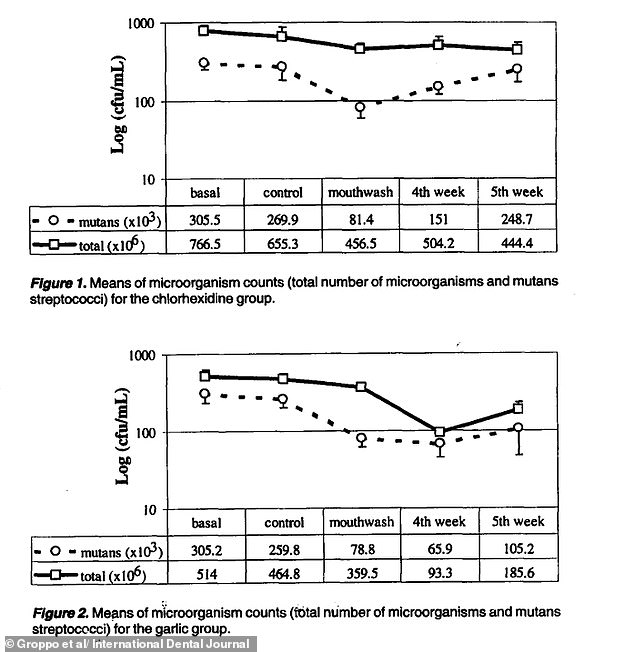As disgusting as it sounds, scientists have uncovered an unlikely ingredient for the next mouthwash – garlic.
Researchers from the University of Sharjah in the United Arab Emirates have discovered that the pungent extract can offer longer–lasting protection than leading brands.
For their study, the team collated the results of five different studies on the topic.
They found that mouthwash made from high concentrations of garlic extract can be just as effective – and even offer longer–lasting protection – compared to those containing chlorhexidine.
This antiseptic is the active ingredient in high street products such as Corsodyl, Covonia and Savlon.
The findings suggest that garlic extract mouthwash could be a ‘viable alternative’ to chlorhexidine in certain products, the authors said.
However, they did point out some drawbacks such as greater discomfort in the mouth.
And there’s no getting away from the distinctive odour.

One of the studies included in the analysis found the amount of bacteria in the mouth was reduced more in the garlic group (solid line on second graph) compared to the chlorhexidine group (solid line on first graph)
‘Chlorhexidine is widely used as a gold standard mouthwash but is associated with side effects and concerns over antimicrobial resistance,’ the authors wrote in the Journal of Herbal Medicine.
‘Garlic, known for natural antimicrobial properties, has emerged as a potential alternative.’
Research has already established garlic as one of nature’s most potent antibacterial and antifungal crops.
Extracts have been used in a range of health products designed to boost heart health, immune function and circulation.
The new meta–analysis revealed that over the course of a week, a three per cent garlic extract mouthwash was ‘significantly more effective’ in reducing the amount of salivary bacteria compared to a 0.2 per cent chlorhexidine mouthwash.
The team said that although garlic extract is not without side effects, they are generally less severe than those linked to chemical compounds.
Chlorhexidine has been known to stain teeth, alter taste sensation and trigger a burning sensation inside the mouth.
Adverse reactions to the garlic extract also included discomfort in the mouth, as well as an unpleasant smell.

A mouthwash containing garlic extract can be as effective and offer longer–lasting protection compared to chlorhexidine products, the study found (file image)
‘Garlic extract mouthwash demonstrated clinical antimicrobial effectiveness, with significant reductions in bacterial counts from baseline,’ the researchers concluded.
They emphasized the need for further clinical research involving larger sample sizes and a longer follow–up to confirm the effectiveness and applicability of using garlic as an alternative mouthwash.
‘These studies have contributed to understanding the antimicrobial role of garlic extract in comparison to synthetic agents like chlorhexidine,’ they added.
‘However, most studies are in vitro, vary in methods and lack clinical standardization, highlighting the need for further research to confirm garlic’s efficacy in dental practice.’
Garlic’s health benefits derive from the many natural compounds it contains, particularly allicin.
A 2018 review of studies by the University of Nottingham said that these benefits are ‘rooted in the sulphur compounds the plant absorbs from the soil’.
These are broken down into around 50 different sulphur–containing compounds during food preparation and digestion, which then become ‘biologically active’ inside our cells.


